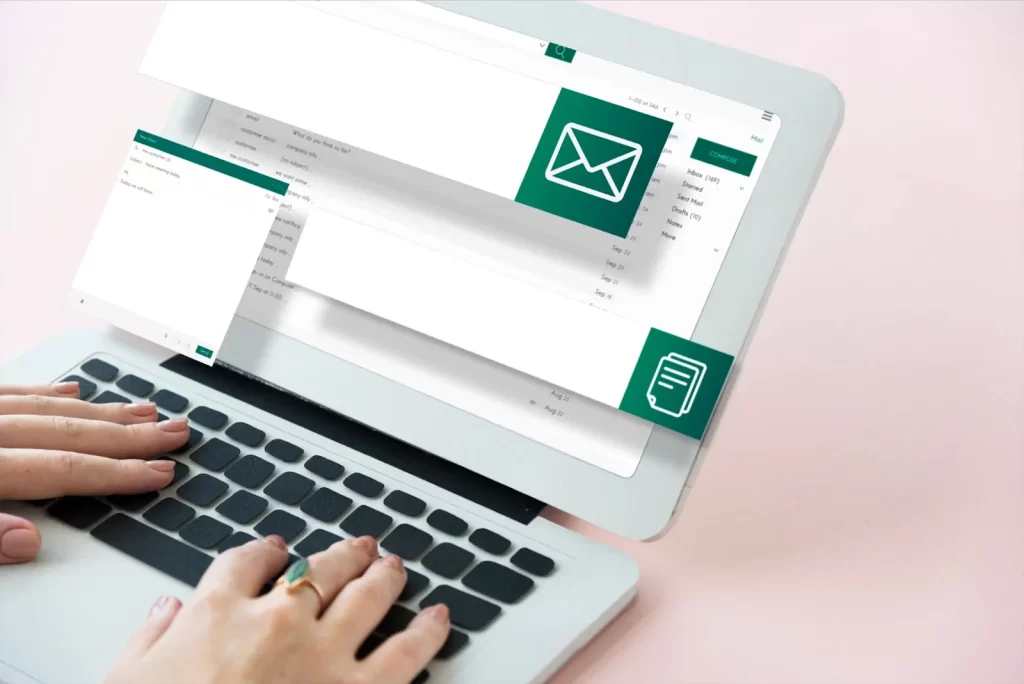Email marketing is a digital marketing strategy that has proven to be effective in promoting products and services, keeping customers engaged with the brand and increasing sales. Although email has been around for decades, it remains an essential tool in the digital age for companies looking to maintain close communication with their customers. In this article we will talk about the benefits of email marketing and how you can start implementing this strategy in your business to increase your brand's visibility and improve your relationship with your customers.
What is e-mail marketing?

Email marketing or email marketing is a strategy regularly used in digital marketing that consists of sending emails to a list of your own contacts to promote products, services, events, news and more interesting information that helps build trust with potential customers.
Email marketing is used to keep current and potential customers informed about company news, brand awareness and increase sales. Emails can be sent at different times, for example, after a purchase, to congratulate a birthday, to promote a new product, to send out a newsletter, etc.
From the point of view of email marketing effectiveness, it is important that the content of the letters is relevant to the recipient, personal and sent on time. In addition, it is important to follow the rules and regulations regarding the sending of emails, such as the possibility to unsubscribe from the contact list and not to send unsolicited messages or spam.
How to do an e-mail marketing campaign?

If you are new to the world of email marketing, it can be overwhelming. But don't worry, here is a basic guide to help you get started successfully.
Step 1: Choose an email marketing platform

The first thing you need to do is choose an email marketing platform. There are many options available, some free and some paid. Look for a platform that suits your needs and budget. Some of the most popular options are Mailchimp, Constant Contact and Aweber.
Step 2: Create a subscriber list
Once you have chosen an email marketing platform, the next thing you need to do is create a subscriber list. This is a list of people who have opted in to receive emails from your company. You can collect email addresses through your website, social media, events and other sources. Try adding a newsletter subscription form on your website, invite visitors to subscribe to receive the latest news about your company. Gradually invite your customers, acquaintances and prospects to sign up. Over time, you will notice that your list has grown.
Step 3: Design your e-mails

The design of your emails is important to capture the attention of your subscribers and persuade them to take a certain action. Create attractive and personalized emails that reflect your brand and message. It is important that you spend some time researching topics that are of interest to your contact list, researching the latest news and tips that you can share with your contact list. Remember, it's not about advertising your business (at least not that obvious), it's about sharing relevant information to your contacts that allows them to see you as an opinion leader and value the information you share.
If you share valuable content with your list of contacts, they will, on their own initiative, seek you out when they want your product or services.
Step 4: Define your objectives

Before sending your emails, it is important that you are clear about your objectives. Do you want to promote a new product? Increase sales of an existing product? Get more subscribers to your newsletter? Some examples of objectives that we can recommend for your e-mail marketing strategy are the following:
- Increase sales: One of the most common goals for an email marketing strategy is to increase sales. This can be achieved by sending promotional emails or by sending follow-up emails to customers who have abandoned their shopping cart.
- Encourage customer loyalty: Another common goal is to encourage customer loyalty. Follow-up emails after a purchase, for example, can include exclusive offers to encourage customers to make future purchases.
- Generate interest in new products: An email marketing strategy can be used to generate interest in new products or services offered by your company. Emails can include images, videos, and product descriptions to publicize what's new.
- Increase website traffic: Another common goal is to increase traffic to your website. Emails can include links to blog articles or promotions that encourage customers to visit the website.
- Build a customer database: An email marketing strategy can also help build a customer database. By requesting the email address in the checkout process or through forms on the website, you can collect valuable information for future campaigns.
- Educate customers: Emails can be used to educate customers about the company and its products or services. They can include tips and tricks related to the use of the products or information about the company's history.
These are just a few examples of objectives that can be set for an email marketing strategy. It is important that you are clear about what your objectives are before you start planning and executing a campaign.
Step 5: Analyze your results

Once you've sent your emails, it's important to analyze your results. See how many emails were opened, how many links were clicked and how many recipients unsubscribed. Use this information to improve your future emails and adjust your email marketing strategy.
Here are some key steps to analyze the results of an email marketing campaign:
- Review basic metrics: Basic metrics include open rate, click-through rate and conversion rate. Open rate refers to the percentage of recipients who opened the email. Click-through rate refers to the percentage of recipients who clicked on a link in the email. Conversion rate refers to the percentage of recipients who took a desired action, such as making a purchase or completing a form. These metrics will give you a general idea of your campaign's performance.
- Analyze segmentation: If you have segmented your email list into different groups, review how each group performed in terms of opens, clicks and conversions. This will help you determine if you should adjust your segmentations in the future.
- Examine the content: Analyze your email content to determine which elements performed well and which did not. Review titles, copy, images and calls to action to see if you could make any adjustments that would improve performance in the next campaign.
- Look at performance on different devices: Review how your email performed on different devices, such as desktop computers, tablets and cell phones. If you find that your email looks different on mobile devices, for example, you may need to make adjustments to ensure the user experience is consistent.
- Perform A/B testing: A/B testing is a way to compare different elements of your campaign to see what works best. For example, you could test two different headlines or two different calls to action to see which one gets better results.
- Compare with previous campaigns: If you have run email marketing campaigns in the past, compare the results of the current campaign with previous campaigns to see if there are any positive or negative trends.
Email marketing can be a powerful tool to reach your customers and promote your products or services. With this basic guide, you are ready to hit the ground running.

